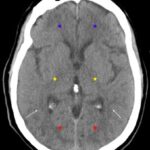Case Report: Altered with PRES
ABSTRACT:
In this case, we discuss a 51-year-old female with history of anxiety, depression, and alcohol abuse who presented for altered mental status, focal neurological deficits, and seizure. She was found to be significantly hypertensive. Non-contrast computed tomography (CT) scan imaging of the head revealed changes suggestive of posterior reversible encephalopathy syndrome (PRES), which was ultimately confirmed by MRI imaging. The patient was treated appropriately with anti-hypertensive therapy and seizure prophylaxis. Due to the prompt recognition of PRES and immediate management, the patient was able to make a favorable neurological recovery. This case highlights the importance of including (PRES) as part of a wide differential diagnosis for a patient with altered mental status, significantly elevated blood pressure, and focal neurological deficits. Early recognition and treatment of PRES can improve neurological outcomes and quality of life for patients.
Topics:
Altered mental status, seizure, hypertensive emergency, posterior reversible encephalopathy syndrome, PRES.



